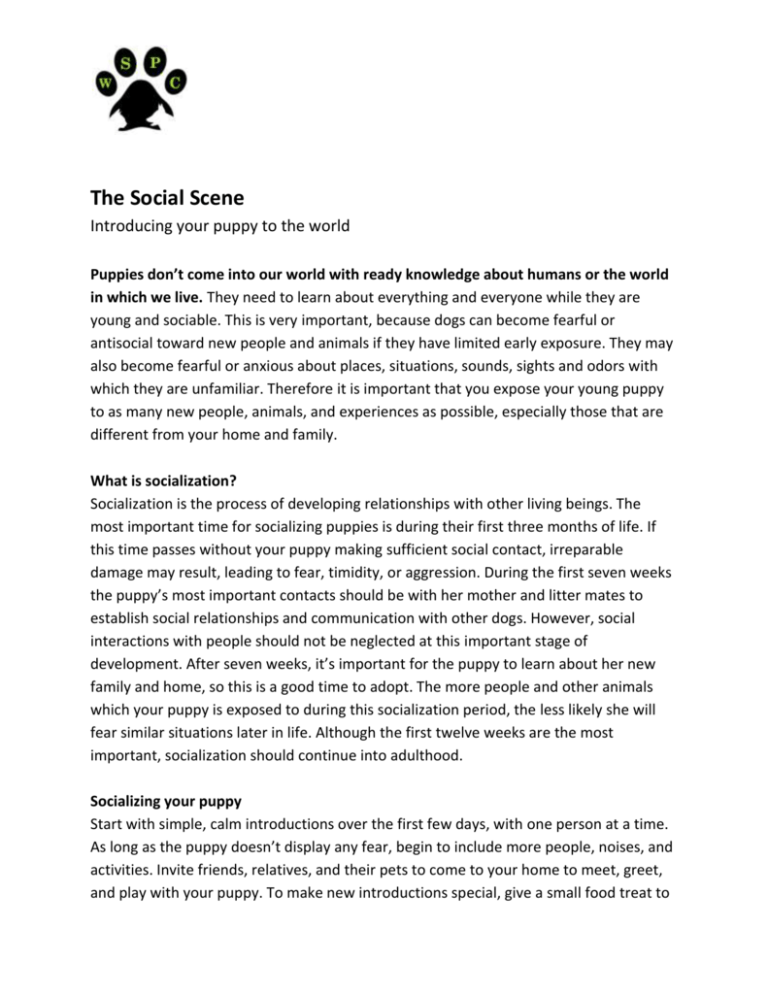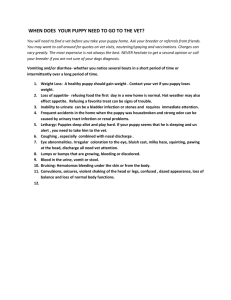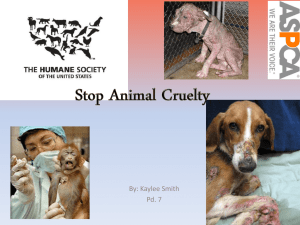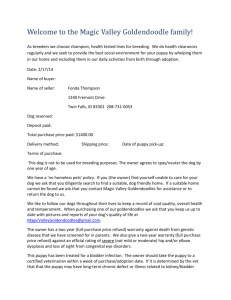The Social Scene - West Side Pet Clinic
advertisement

The Social Scene Introducing your puppy to the world Puppies don’t come into our world with ready knowledge about humans or the world in which we live. They need to learn about everything and everyone while they are young and sociable. This is very important, because dogs can become fearful or antisocial toward new people and animals if they have limited early exposure. They may also become fearful or anxious about places, situations, sounds, sights and odors with which they are unfamiliar. Therefore it is important that you expose your young puppy to as many new people, animals, and experiences as possible, especially those that are different from your home and family. What is socialization? Socialization is the process of developing relationships with other living beings. The most important time for socializing puppies is during their first three months of life. If this time passes without your puppy making sufficient social contact, irreparable damage may result, leading to fear, timidity, or aggression. During the first seven weeks the puppy’s most important contacts should be with her mother and litter mates to establish social relationships and communication with other dogs. However, social interactions with people should not be neglected at this important stage of development. After seven weeks, it’s important for the puppy to learn about her new family and home, so this is a good time to adopt. The more people and other animals which your puppy is exposed to during this socialization period, the less likely she will fear similar situations later in life. Although the first twelve weeks are the most important, socialization should continue into adulthood. Socializing your puppy Start with simple, calm introductions over the first few days, with one person at a time. As long as the puppy doesn’t display any fear, begin to include more people, noises, and activities. Invite friends, relatives, and their pets to come to your home to meet, greet, and play with your puppy. To make new introductions special, give a small food treat to your puppy whenever she meets someone. However, do not give the treat if she is lunging or jumping up. Teach her to sit before giving treats or attention. When our veterinarian says your puppy is adequately vaccinated, take her on as many walks and outings as possible but be careful to avoid areas where stray dogs (that may carry diseases) roam. It is important that your puppy meet and receive treats from a wide variety of people, of all ages and appearances. A puppy that grows up in a restricted social group, such as all adults or all females, may show fear and aggressions when later exposed to children or men. Some pups seem to consider children a completely different species since they walk, act, and talk much differently than adults. If there are no children living at home, it is likely your puppy will encounter them at some time. Therefore, you may need to go out of your way to provide your puppy with plenty of positive interactions with children during her early months. The same is true for anything else that is not normally found in your home, such as men with beards or people wearing hats or uniforms. What is habituation? Habituation describes how a pet can adapt to new environments through repeated exposure. As your puppy matures, new situations can lead to fear and anxiety. Begin habituation at an early age by frequently exposing your puppy to different sights, sounds, odors, surfaces, and situations. For example, repeated short car rides can minimize car ride anxiety – provided that nothing unpleasant occurs during the ride. Expose your puppy to a variety of stimuli, such as traffic sounds, sirens, airplanes, water, elevators and alarm clocks. If your puppy seems to be exceptionally cautious when first introduced, start with mild exposure and give food rewards for non-fearful responses. Your puppy can then be gradually “built up” to more intense exposure. Recordings of sounds are available if it’s difficult for you to expose your puppy to these sounds in your own neighborhood. Additional help An excellent way to promote early socialization and habituation is to enroll your pet in a puppy class. These classes offer a great opportunity for socialization and an early start in training at a time when puppies learn rapidly and before bad habits are picked up. Many communities now have classes where puppies can be admitted as early as eight weeks of age. Puppy classes should provide a variety of exposure opportunities that might not be available in your home. These should include meeting and playing with a variety of people and dogs, as well as fun opportunities to habituate to different surfaces, obstacles, sounds, and moving objects such as skateboards, seesaws, wheelchairs, or even vacuum cleaners. By exposing your puppy to these experiences in a controlled and fun environment, she will less likely be fearful of later experiences and be well prepared should you wish to progress to agility training or hospital visitation programs. Ask our veterinarian about what classes are available in your area. A commercial collar or diffuser with pheromones that simulate those produced by a nursing mother dog may also help reduce fear and improve sociability. Punishment can negatively influence your puppy’s relationship with people. Therefore, avoid training methods and classes that use physical punishment or that recommend the use of physical confrontation such as rolling over, pinning down, or shoving your dog’s face in a mess. These methods could make your dog fearful of the human hand or even cause her to snap at you in fear. During the early months of you puppy’s life, stay positive and minimize interactions that might make your pet anxious. Even veterinary visits can be made positive by keeping upbeat and brining along your puppy’s favorite treats. Properly socializing and shaping your puppy’s temperament requires an investment in time and patience. But your efforts will all be worthwhile when you become the proud parent of a social, friendly, well-adjusted dog.




